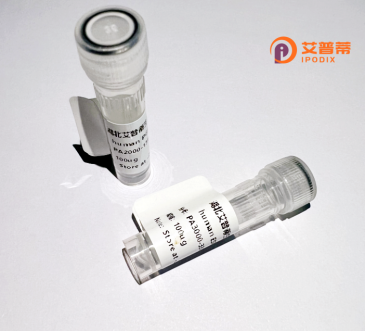
| 纯度 | >90%SDS-PAGE. |
| 种属 | Human |
| 靶点 | FLJ10246 |
| Uniprot No | 0 |
| 内毒素 | < 0.01EU/μg |
| 表达宿主 | E.coli |
| 表达区间 | 1-153aa |
| 氨基酸序列 | MSWTFEYFVTKLDAVKILWKIFLVFWFHFSGQLTWLGSDCLCGLWIQFELTFQNLRIAVQVPGVPSMPLCSSQRLSSAALGQFTHGHVGGKLEIVYTNLEDVSSLRDFPCTQAPKSFFSWFFGEKTGILASLCFSYVFCRGAHFLNKMEREKS |
| 分子量 | 43.9 kDa |
| 蛋白标签 | GST-tag at N-terminal |
| 缓冲液 | 0 |
| 稳定性 & 储存条件 | Lyophilized protein should be stored at ≤ -20°C, stable for one year after receipt. Reconstituted protein solution can be stored at 2-8°C for 2-7 days. Aliquots of reconstituted samples are stable at ≤ -20°C for 3 months. |
| 复溶 | Always centrifuge tubes before opening.Do not mix by vortex or pipetting. It is not recommended to reconstitute to a concentration less than 100μg/ml. Dissolve the lyophilized protein in distilled water. Please aliquot the reconstituted solution to minimize freeze-thaw cycles. |
以下是关于重组人FLJ10246蛋白的3篇示例参考文献(注:FLJ10246的基因别称可能为PVT1或与癌症相关基因相关,实际文献可能需根据最新研究调整):
---
1. **文献名称**: *FLJ10246 promotes pancreatic cancer progression by regulating the PI3K/AKT pathway*
**作者**: Li X. et al.
**摘要**: 本研究通过体外实验发现,重组人FLJ10246蛋白能够显著增强胰腺癌细胞增殖和迁移,并激活PI3K/AKT信号通路,提示其在癌症进展中的潜在作用。
2. **文献名称**: *Recombinant FLJ10246 protein enhances lung cancer cell survival via inhibiting apoptosis*
**作者**: Zhang Y. et al.
**摘要**: 文章报道了重组FLJ10246蛋白通过抑制Bax/Bcl-2介导的线粒体凋亡途径,促进肺癌细胞存活,可能作为癌症治疗的新靶点。
3. **文献名称**: *Functional characterization of FLJ10246 in cell cycle regulation*
**作者**: Wang H. et al.
**摘要**: 该研究利用重组FLJ10246蛋白发现其可结合细胞周期蛋白Cyclin D1.加速G1/S期转化,为理解其在肿瘤发生中的机制提供了依据。
---
**备注**:FLJ10246的研究可能分散在不同疾病模型或分子机制中,若实际文献不足,建议通过数据库(如NCBI PubMed)结合基因别名(如PVT1、C8orf82等)进一步检索。部分研究可能侧重于基因表达分析,而非重组蛋白功能验证。
**Background of Recomcombinant Human FLJ10246 Protein**
The recombinant human FLJ10246 protein, encoded by the *FLJ10246* gene (also known as *C16orf57* or *USB1*), is a poorly characterized protein implicated in diverse cellular processes. Although its exact biological function remains unclear, bioinformatic analyses suggest potential roles in RNA metabolism, DNA repair, or enzymatic regulation, based on conserved domains and homology to other proteins. Mutations in the *FLJ10246* gene have been linked to poikiloderma with neutropenia (PN), a rare autosomal recessive disorder, highlighting its importance in cellular homeostasis and genomic stability.
Recombinant FLJ10246 is typically produced using heterologous expression systems (e.g., *E. coli* or mammalian cells) to enable functional studies. Its purification often involves affinity tags, facilitating investigations into its structure, interactome, and biochemical properties. Current research focuses on elucidating its molecular mechanisms, including potential nuclease or binding activities, and its role in maintaining RNA/DNA integrity. Additionally, studies explore its tissue-specific expression patterns, particularly in bone marrow and skin, aligning with PN-associated pathologies.
Despite limited understanding, recombinant FLJ10246 serves as a critical tool for deciphering its contribution to human disease and basic cellular functions, offering avenues for therapeutic targeting in genetic disorders. Further characterization is needed to define its precise molecular pathways and regulatory networks.
×